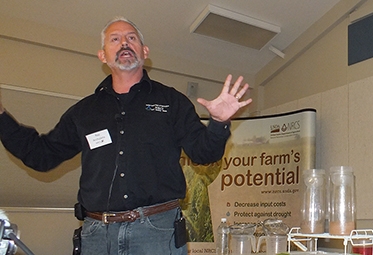Ray Archuleta: man on a soil health mission

By Surya Zeeb
Published: June 2, 2020
Category: Regenerative Agriculture, The Organic & Non-GMO Report Newsletter
At his popular presentations on soil health, Ray Archuleta, a soil scientist with the USDA’s Natural Resources Conservation Service (NRCS), often tells his audience: “Cover crops are your first step to freedom!”
Archuleta is one of NRCS’s and one of the nation’s leaders in emphasizing soil health to farmers. His message is that many modern farming practices are hurting the soil and farmers’ pocketbooks.
Archuleta advocates for a regenerative farming system, one built more on ecology and less on the reliance of chemical fertilizers and pesticides. Such farming emphasizes more diversity while limiting the biological, chemical, and mechanical disturbances of the soil.
“All of these tools that we have—fertilizers, tillage, herbicides, pesticides—all have unintended consequences,” Archuleta explains. “But you cannot become economically resilient until you become ecologically resilient.”
Archuleta is among a growing number of scientists and farmers who aim to change agriculture by changing the way farmers, agronomists, and federal programs treat the soil. Archuleta encourages farmers to embrace “bio-mimicry” or mimicking nature when they farm. He argues that farmers who adopt no-till production with a multispecies cover-crop mix can improve the biology and nutrients in their soil to the point they will reduce their fertilizer and pesticide applications.
Well-known regenerative farmer Gabe Brown, who farms in North Dakota, admires Archuleta and says people “get an earful” when they hear him speak.
“That’s one of the things that endears me to Ray—he is one of the few government employees who tells it like it is,” Brown says.
While he once might have been considered on the fringe of a movement, Archuleta is now viewed as someone who got the cover-crops movement where it is today.
Archuleta’s workshops and field have helped drive the adoption of cover crops. During these events, Archuleta demonstrates how soils respond to water under tilled and no-till systems.
“We’re selling concepts of soil health,” Archuleta says. “I want them [farmers] to see so they can never forget.”
Archuleta plans to retire from USDA but will continue his work with the Understanding Ag, LLC, a soil health consulting firm and Soil Health Academy, a new organization formed to provide education programs about soil health.
Source: Progressive Farmer
To view source article, visit: https://www.dtnpf.com/agriculture/web/ag/crops/article/2017/03/01/mission?kqpuN




